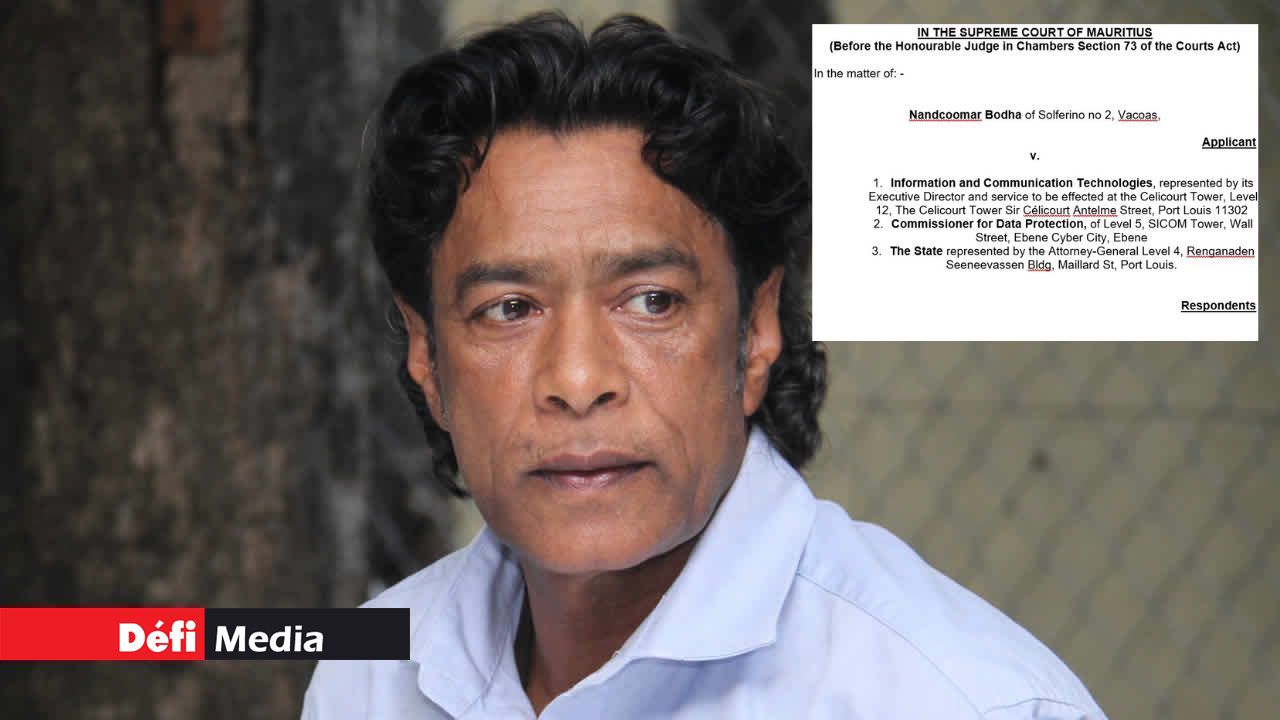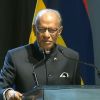
L’ancien ministre des Affaires étrangères, Nando Bodha, a initié une action en Cour suprême ce vendredi. Il demande, entre autres, un ordre pour l’institution d’une enquête sur des activités présumées d’espionnage à Maurice. Cette démarche intervient après la publication d’enregistrements téléphoniques par les pseudonymes « Missie Moustass » et « Missie Labarbe » en pleine campagne électorale.
Publicité
Nando Bodha a dirigé son action en justice contre l’Information and Communication Technologies Authority (ICTA), le Commissioner for Data Protection et l’État. L’affaire sera entendue le 18 décembre.
Dans un communiqué, Nando Bodha explique les raisons de son action :
« En tant qu’avocat, ancien ministre des Affaires étrangères et leader politique, j’ai engagé des procédures judiciaires pour relever l'un des défis les plus urgents auxquels Maurice est confronté aujourd'hui. Le problème ? Un système de télécommunications compromis qui a exposé notre nation à l’espionnage, au crime organisé et à l’érosion des principes démocratiques. Il faut d’urgence restaurer l’intégrité de notre système de gestion des réseaux de télécommunications. [xxx] Les révélations de ‘Missie Moustass’ et de ‘Missie Labarbe’, qui ont exposé des interceptions non autorisées de communications privilégiées et sensibles, ébranlent les bases mêmes de nos institutions démocratiques. »
Vous trouverez ci-dessous son affidavit dans son intégralité.
IN THE SUPREME COURT OF MAURITIUS
(Before the Honourable Judge in Chambers Section 73 of the Courts Act)
In the matter of: -
Nandcoomar Bodha of Solferino no 2, Vacoas,
Applicant
v.
- Information and Communication Technologies, represented by its Executive Director and service to be effected at the Celicourt Tower, Level 12, The Celicourt Tower Sir Célicourt Antelme Street, Port Louis 11302
- Commissioner for Data Protection, of Level 5, SICOM Tower, Wall Street, Ebene Cyber City, Ebene
- The State represented by the Attorney-General Level 4, Renganaden Seeneevassen Bldg, Maillard St, Port Louis.
Respondents
APPLICANT’S AFFIDAVIT
I, Nandcoomar Bodha also known as Nando Bodha, a Barrister, of Solferino no 2, Vacoas and holder of a Mauritian passport bearing no. 1506067:
MAKE SOLEMN AFFIRMATION AS A HINDU AND SAY AS FOLLOWS:
1. Introduction
1.1. I am the Applicant in this matter. I as Mauritian citizen, a barrister, and have previously served as a Minister, including holding the portfolio of Minister for Foreign Affairs. During my tenure, I dealt extensively with foreign governments and diplomats on critical issues, including:
a) I have a strong background in tourism, sustainable development, agro-processing, sugar reforms, modern infrastructure, land transport planning, road safety, and project and crisis management as well as maritime security. I have been a leading figure at the Alliance Linion Reform and a candidate for Prime Ministership in the last general elections.
b) I have been instrumental in promoting intergovernmental processes, facilitating regional collaboration, and negotiating the Free Trade Agreement between India and Mauritius and China.
c) I have also been closely associated with the struggle of Mauritius against the United Kingdom to recover the sovereignty of the Chagos archipelago, which is considered the fight for the complete decolonisation of Africa. I have been engaged in negotiations, particularly concerning Diego Garcia’s use as a military base and on several sensitive, important and urgent matters requiring strategic diplomacy and confidentiality.
d) Mauritius's removal from the EU blacklist related to the Financial Action Task Force (FATF), involving complex discussions with international organisations, foreign governments, and diplomats.
e) Overseeing the repatriation of approximately 10,000 Mauritian citizens who were stranded abroad during the COVID-19 pandemic, a challenging operation conducted under urgent and extraordinary circumstances.
1.2. I make this affidavit in support of my application for a mandatory order under Section 73 of the Courts Act against the Information and Communication Technologies Authority (ICTA).
1.3. The facts set out herein are within my personal knowledge and belief, save where otherwise stated. For the avoidance of any doubt whereever I am refering to the Applicant in this affidavit I am refering to myself.
2. The Respondents
2.1. The First Respondent, the Information and Communication Technologies Authority (ICTA), is a statutory body established under the Information and Communication Technologies Act (the "Act") and is entrusted with the regulation and oversight of telecommunication services in Mauritius.
2.2. Under the Act, the ICTA has the following statutory responsibilities and obligations:
a) Regulation of Telecommunication Services: Ensuring the provision of reliable, secure and efficient communication systems in Mauritius.
b) Licensing and Compliance: Granting licences to telecommunication service providers and ensuring their compliance with the terms and conditions of these licences, particularly with respect to security and privacy.
c) Data Protection and Privacy: Safeguarding the privacy of individuals by ensuring that communication systems are not unlawfully intercepted, accessed or compromised.
d) National Security and Public Interest: Collaborating with stakeholders to protect the national telecommunication infrastructure from misuse or exploitation that could threaten public safety or national security.
e) User Protection: Addressing complaints and ensuring that telecommunication users are not subjected to breaches of trust, data theft, or unauthorised surveillance.
2.3. The overriding duties of the ICTA include the protection of users' rights to privacy and confidentiality in communication, which are fundamental to upholding the principles of democracy and the rule of law. The ICTA is also obligated to act transparently, fairly and promptly to address any vulnerabilities or breaches within the telecommunication network.
2.4 The Second Respondent, the Commissioner for Data Protection, is the statutory authority established under the Data Protection Act 2017 to oversee and enforce compliance with data protection laws in Mauritius. The Commissioner is responsible for ensuring the protection of i personal data and privacy rights, investigating breaches of the Data Protection Act, and taking appropriate enforcement actions against violators. Given the widespread breaches of data security highlighted herein, the involvement of the Second Respondent is critical to ensuring that the necessary regulatory and enforcement measures are undertaken to protect the integrity of telecommunications and uphold citizens’ privacy rights.
2.5 The Third Respondent, the State, represented herein by the Honourable Attorney-General, bears constitutional and statutory responsibilities to ensure the security, integrity and proper functioning of public telecommunications systems in Mauritius. The State is also responsible for safeguarding the fundamental rights and freedoms of its citizens, including the right to privacy and freedom of expression enshrined in the Constitution of Mauritius. The Applicant avers that the failures identified in this application—including the systemic vulnerabilities that facilitated unlawful interception and dissemination of private communications—constitute a serious breach of the State’s duties and obligations. Accordingly, the Third Respondent's inclusion is necessary to address and remedy these failures comprehensively.
3. The Applicant’s Legal Rights
3.1. The Applicant asserts the following legal rights, which are directly and adversely affected by the Respondents failure to provide a secure and reliable telecommunication system:
a) As a Former Foreign Minister and Political Leader:
- The Applicant has played a pivotal role in advancing shared fundamental values of democracy, human rights and the rule of law among states with whom Mauritius has historically enjoyed excellent bilateral and multilateral relationships.
- These relationships have been built on mutual trust and common concerns over rogue nations and global security threats, particularly in the context of international diplomacy, where confidentiality is paramount.
- The Respondents failure to safeguard sensitive communication systems jeopardises these established relationships and undermines the integrity of diplomatic exchanges.
b) As a Defender of the Rule of Law, Democratic Principles and Human Rights:
- The Applicant has consistently championed democratic ideals and human rights, both domestically and internationally.
- The exposure of unlawful surveillance, interception, or manipulation of communications severely undermines the rule of law and threatens the democratic fabric of Mauritius, which the Applicant has sought to uphold.
c) As a Practising Barrister:
- The Applicant’s profession requires strict adherence to the principles of confidentiality and privilege in legal communications.
- The failure of the Respondents to prevent unauthorised access to communication systems exposes the Applicant’s professional and client communications to potential breaches, violating both statutory and ethical duties.
d) As a Mauritian Citizen:
- The Applicant’s constitutional rights under the Constitution of Mauritius, particularly:
i. The Right to Privacy: Enshrined under Section 9, which protects against arbitrary interference with private and family life.
ii. The Right to Freedom of Expression: Guaranteed under Section 12, which includes the freedom to receive and impart ideas without fear of unlawful surveillance or interference.
- These rights are fundamental to the Applicant’s personal freedoms and professional responsibilities and are directly infringed by the Respondents’ failure to secure the telecommunication network.
3.2. The Applicant contends that the protection of these rights is not only vital for his personal and professional interests but also for upholding the principles of justice, democracy and the rule of law in Mauritius.
3.3. The First Respondent, as the regulatory authority established under the Information and Communication Technologies Act 2001, has a statutory obligation under section 18(1)(b) to ensure the security and proper functioning of telecommunication networks and services in Mauritius. Additionally, under section 18(1)(m), the First Respondent is empowered to take necessary measures to safeguard the interests of users in respect of the privacy and confidentiality of communications. Despite these clear statutory duties, the First Respondent has failed to discharge its obligations effectively, as evidenced by the revelations stemming from the “missier moustass” and “missie labarbe” controversy. This failure has resulted in widespread breaches of privacy, compromised the integrity of telecommunications systems and exposed the nation to significant risks, including espionage, data theft, and threats to national security.
3.3. The Second Respondent, as the authority established under the Data Protection Act 2017, has a statutory duty under section 5 to ensure compliance with data protection principles, including safeguarding personal data and preventing unlawful access to, or processing of, such data. Furthermore, under section 22, the Second Respondent is empowered to investigate complaints and take enforcement action against breaches of data protection obligations. Despite these duties, the Second Respondent has failed to take adequate steps to investigate or address the apparent large-scale violations of data protection laws arising from the “missier moustass” and “missie labarbe” controversy. This failure has exacerbated the breaches of privacy and confidentiality, undermining public trust in the protection of their personal data and in the functioning of democratic institutions.
3.4. The Third Respondent, as the State, bears a constitutional obligation under sections 3, 9, and 12 of the Constitution of Mauritius to protect fundamental rights, including the right to privacy, the freedom from arbitrary interference, and the freedom of expression. Section 12 specifically guarantees the right to freedom of expression, which includes the right to hold opinions and to communicate ideas and information without interference. The State also has a duty to create an environment where these rights can be fully and meaningfully enjoyed by all citizens.
3.5 However, the State’s apparent inaction in addressing the grave allegations of mass surveillance, illegal data interception, and the unauthorised disclosure of private communications, as revealed by the “missier moustass” and “missier labarbe” controversy, has directly undermined the enjoyment of these rights. By failing to safeguard the integrity of telecommunications systems and to investigate or remediate the breaches, the State has allowed a climate of fear and mistrust to prevail. This has had a chilling effect on freedom of expression, as citizens, including the Applicant, now fear that their private communications may be intercepted, manipulated, or exposed, thereby curtailing their ability to freely express themselves.
3.6 The State’s failure to ensure that robust safeguards and oversight mechanisms are in place to prevent such abuses is a breach of its constitutional duty and threatens the foundation of a democratic society that relies on the free flow of information and the exercise of civil liberties.
4. Background Facts
4.1. The leaks attributed to “missier moustass”and “misssie labarbe” have revealed deeply concerning vulnerabilities in the national telecommunication system. These revelations demonstrate the Respondent’s failure to ensure the security and confidentiality of sensitive communications, exposing individuals, businesses, government officials, and institutions to severe risks.
4.2. The issues arising from these leaks include, but are not limited to:
a) The interception of voice calls, including privileged communications between lawyers and clients, diplomats and government officials, and private individuals.
b) The manipulation of data, potentially allowing malicious actors to falsify information, disrupt communication networks, and compromise the integrity of financial and legal transactions.
c) The unauthorised disclosure of information concerning national security, trade secrets and confidential business strategies.
4.3. The risk posed by unlawful tapping of communication systems extends to critical police operations, particularly in the fight against organised crime, including drug trafficking and terrorism.
a) High-ranking police officers, such as the Commissioner of Police (CP) and Deputy Commissioner of Police (DCP) for the Anti-Drug and Smuggling Unit (ADSU), routinely exchange highly sensitive information regarding planned raids, surveillance operations, and intelligence assessments.
b) The interception of such communications by unauthorised individuals or criminal networks compromises the effectiveness of these operations, allowing organised crime groups to evade capture, destroy evidence, or adjust their strategies.
c) The potential for the interception of police communications jeopardises the safety of officers and the public, increasing the risk of violent encounters and undermining public confidence in law enforcement’s ability to protect them.
d) Sensitive operations shared between the CP and DCP for ADSU could be transmitted to drug traffickers or organised crime networks, enabling them to plan countermeasures, change locations, or alter their distribution networks, thus exacerbating the illegal drug trade.
4.4. The implications of such vulnerabilities extend beyond law enforcement:
a) Trade Secrets: Businesses that rely on secure communications to discuss proprietary technologies, strategic partnerships, or mergers and acquisitions risk losing their competitive advantage to rivals or hostile actors.
b) Stock Market Manipulation: Intercepted insider information can be exploited to manipulate the stock exchange, resulting in significant financial losses and undermining investor confidence.
c) Diplomatic Relations: The interception of communications between government officials and foreign diplomats raises serious concerns about espionage and could damage Mauritius’s reputation as a reliable and secure partner on the global stage.
4.5. The failure to protect sensitive communication channels also poses a substantial threat to the principles of confidentiality in the administration of justice. Leaked information implicating judges, lawyers and clients has raised grave concerns about the sanctity of privileged communications and judicial independence. Such breaches can undermine the public’s trust in the legal system, discourage individuals from seeking legal counsel, and inhibit the fair conduct of trials.
4.6. Furthermore, the leaks have shown that high-level conversations between Mauritius and foreign diplomats were potentially intercepted. This includes confidential discussions that could raise severe concerns about the use of surveillance equipment, especially given Mauritius’s use of Huawei technology. Such capabilities may be exploited for espionage, potentially placing the nation's sovereignty and national security at risk.
4.7. The disclosure of privileged and confidential communications, as exposed in the “missier moustass” and “missie labarbe” leaks, has far-reaching consequences:
a) It erodes trust in the confidentiality of the telecommunication system, which is foundational to the rule of law and democratic governance.
b) It jeopardises ongoing investigations, negotiations, and collaborations that rely on secure communication channels.
c) It exposes individuals and institutions to blackmail, coercion, or exploitation by malicious actors.
4.8. The Respondent’s failure to detect, prevent and remedy these vulnerabilities highlights a grave dereliction of its statutory responsibilities. This failure directly undermines the Applicant’s legal rights and poses a significant threat to national security, economic stability, and public trust in Mauritius’s telecommunication infrastructure.
4.9. The Applicant avers that Missier Moustass has unlawfully uploaded audio recordings of telephone conversations involving a wide array of individuals, including journalists, opposition members, lawyers, members of the judiciary (a judge and possibly a magistrate), diplomats (including the British High Commissioner), members of the Executive, the Commissioner of Police, high-ranking police officers, advisers to the Prime Minister, Ministers, the Prime Minister and his wife. These recordings, obtained without authorisation, are a direct violation of privacy and represent a serious breach of trust and the constitutional rights of the individuals concerned.
These recordings have been made publicly available on various online platforms and can still be accessed on the internet. Below are examples of URLs where these recordings can be found, titled Missier Moustass Secrets Lakwizinn Full Sezon 1 – 10:
Missie Moustass Secrets Lakwizinn Full Sezon 1 – 10 (a 3 hr 24 minutes Videos): https://www.youtube.com/watch?v=juNpr1hBi0s
Season 1: https://www.youtube.com/watch?v=--tT9wDCdCQ&t=972s
Season 2: https://www.youtube.com/watch?v=2MEEX8sjKUo
Season 7: https://www.youtube.com/watch?v=7wDRKh9Gmqs&t=6s
Season 8: https://www.youtube.com/watch?v=L7vbATTShFA&t=326s
Season 9: https://www.youtube.com/watch?v=Uigx3rEJaxE
Season 10: https://www.youtube.com/watch?v=Ih8wpktYQcY&t=11s
Season 10 Part 1: https://www.youtube.com/watch?v=4rfoMsAm9k4
Season 10 Ep 4: https://www.youtube.com/watch?v=wh_MjuJmWGU&t=6s
4.10. The Applicant underscores the gravity of these violations, which not only infringe upon the constitutional right to privacy but also undermine public confidence in the integrity of telecommunications and the rule of law. This pervasive dissemination of unlawfully obtained communications poses a significant threat to personal and national security, the administration of justice, and the functioning of Mauritius as a democratic state.
Leaked information linking Dr. Navin Ramgoolam, Paul Berenger and Sherry Singh with Missier Moustass?
4.11 A leaked video has surfaced where one Dr. Navin Ramgoolam is seen discussing with one Mr Paul Raymond Berenger regarding the use of tapping devices dating back to 1999, a practice he admits to having initiated and continued until one Mr. Sherry Singh took over. In the video, Ramgoolam acknowledges the past use of these devices and suggests that Singh has continued this clandestine activity, now involving himself in assisting with the recordings. This footage is crucial as it points to a coordinated effort involving Singh to manipulate public perception through the release of sensitive information, underscoring the strategic use of surveillance to support the Alliance du Changement’s electoral strategy. From the tenor of the conversation it can be gathered that the conversation took place after last the dissolution of the National Assembly.
5. Prejudice to the Applicant
5.1. The Applicant, as a prominent political leader, barrister, and citizen of Mauritius, has been subjected to significant prejudice (as almost all the members of the public in Mauritius) as a direct result of the Respondent’s failure to ensure the security and confidentiality of the national telecommunication system. This failure has breached the Applicant's constitutional rights, undermined trust in democratic governance, and posed a real and present danger to the Applicant’s ability to carry out his duties effectively and safely.
5.2. Prejudice as a Politician:
a) As a politician, the Applicant has consistently advocated for democratic principles, transparency and human rights. The exposure of private and strategic communications has seriously impeded his capacity to serve the public and represent the interests of his constituents. The Applicant’s ability to engage in confidential negotiations, secure in the knowledge that sensitive matters will remain private, has been compromised.
b) The Applicant’s role in promoting Mauritius's democratic ideals and fostering international relations has been undermined. The fear that confidential dialogues with foreign partners, especially those on matters of national security and international trade, could be intercepted has damaged the trust placed in Mauritius by other states. This betrayal of confidence weakens diplomatic ties and diminishes Mauritius’s credibility as a reliable and secure partner in international forums.
5.3. Prejudice as a Barrister:
a) The Applicant, in his capacity as a barrister, has been grievously affected by the violations of professional confidentiality. The tapping of privileged communications between barristers and their clients represents a direct infringement on the sanctity of the attorney-client relationship—a cornerstone of the legal profession. Such breaches compromise the Applicant’s ability to advise clients freely and without the threat of surveillance.
b) The risk of intercepted conversations between judges and magistrates and lawyers threatens the foundation of impartiality and fairness within the judiciary. The possibility of judges and magistrates being under surveillance and their conversations being accessed poses an unprecedented risk to the independence of the judiciary. This situation invites potential blackmail or undue influence, raising doubts about the legitimacy of judicial processes. Such a reality compromises the Applicant’s ability to engage in legal proceedings confidently and represents a chilling effect on the legal profession as a whole.
c) The erosion of privilege and confidentiality in legal contexts stifles the ability of the Applicant to defend clients effectively. Clients may hesitate to disclose all relevant information due to the risk of surveillance, hindering their right to a fair trial and access to justice.
5.4. Prejudice as a Citizen:
a) As a citizen of Mauritius, the Applicant is deeply concerned about living in an environment where fundamental constitutional rights namely, freedom of expression and the right to privacy are compromised. The fear of constant surveillance and interception of private communications breeds anxiety and a pervasive sense of insecurity. The erosion of these rights has profound implications for democratic freedoms, curtailing the space for open debate, dissent, and the exchange of ideas.
b) The Applicant’s right to freely express opinions, participate in public discourse, and engage in political and civic activities is threatened by the chilling effect that surveillance imposes. This deters not only the Applicant but also other citizens from speaking freely or challenging those in power for fear of retribution or exposure.
5.5. Damage to Diplomatic Relations:
a) The Applicant’s role in fostering international partnerships and maintaining diplomatic relations has been adversely impacted. The leaks demonstrate a lack of security that endangers confidential communications between Mauritius and foreign governments, including those involving critical issues such as the Chagos Archipelago and Agalega, trade and economic collaboration. Such exposure can lead to a perception of Mauritius as an unreliable partner, affecting trust, investments, and cooperation.
b) The Applicant’s own capacity to represent Mauritius with the confidence that sensitive diplomatic dialogues remain protected has been eroded. The fear that intercepted communications could be used to exploit Mauritius politically or economically poses a significant risk to national interests.
5.6. The Seriousness of Tapping Privileged Information:
a) The interception of privileged communications between judges and magistrates undermines the principles of judicial independence and fairness. The possibility of these conversations being overheard creates an environment where impartiality is at risk, inviting questions about the integrity of decisions made by the judiciary. The Applicant is compelled to highlight that the potential for blackmail or coercion stemming from tapped conversations can compromise judges' ability to act without fear or favour, leading to a significant erosion of the rule of law.
b) The damage to the public perception of the judicial system is profound. Citizens are entitled to a judiciary that operates free from external influence or surveillance. When such fundamental principles are compromised, public confidence in the legal system declines, resulting in a distrust of justice and a belief that justice is no longer blind but beholden to external forces.
5.7. Impact on National Security:
a) The Applicant is concerned about the implications for national security, particularly given the potential for intelligence exploitation by foreign adversaries or criminal organisations. The risk that sensitive communications, whether related to strategic defence discussions, geopolitical issues, law enforcement operations, or matters of state security, are being accessed raises the spectre of espionage at the highest levels.
b) The fear of compromised police operations, such as those conducted by the Anti-Drug and Smuggling Unit, poses a genuine risk to public safety. The knowledge that criminal syndicates or adversaries could be tipped off about strategic law enforcement efforts severely hampers the fight against organised crime, including drug trafficking and terrorism.
5.8. Prejudice to the Administration of Justice:
a) The breaches have cast a shadow over the sanctity of legal and judicial confidentiality, raising fears that privileged and sensitive information may be used against individuals, organisations, the press, institutions or the state. This undermines not only the Applicant’s professional integrity but also that of the broader legal community and judiciary.
b) The Applicant fears that, as a result of these breaches, there is a significant threat to the ability of individuals to rely on the constitutional protections afforded to them, including their right to privacy and freedom from arbitrary interference.
6. Urgency
6.1. The Applicant avers that the urgency of this application is manifest and cannot be overstated. The circumstances surrounding the interception of communications, as highlighted in the 'Missier Moustass' and “Missie Labarbe” revelations, pose a significant and immediate threat to the safety, security, and democratic integrity of Mauritius. The longer this breach remains unaddressed, the greater the damage to the Applicant, the administration of justice, and the sovereignty of the state.
6.2. Immediate Threat to National Security and Public Safety:
a) The Applicant avers that the interception of private, sensitive communications within the telecommunications network has implications that extend beyond individual rights and touches upon national security. The vulnerability of the core network, particularly with the involvement of Huawei equipment and software and the reference to China in parliamentary debates in the UK in this context, raises alarms regarding potential foreign surveillance, espionage, and manipulation. The Applicant's concerns are urgent as the longer this issue persists, the greater the risk of harmful influence, sabotage, or exploitation by external actors.
b) The risk of disruption to law enforcement operations is immediate, with tapped communications potentially alerting criminal enterprises to planned raids, investigations, or surveillance efforts. This jeopardises not only the safety of law enforcement personnel but also the security of the public. The consequences of an information leak could lead to an escalation in organised crime, including drug trafficking, terrorism, and other forms of criminal activity.
c) The Applicant avers that the potential for disruption to emergency services and critical infrastructure exacerbates the urgency of this matter. Any breach of communications between these entities could have devastating implications for public safety and national stability.
6.3. Prejudice to the Administration of Justice:
a) The Applicant avers that the urgency of the application is underlined by the direct and ongoing risk posed to the judicial system. The tapping of privileged conversations between judges, magistrates and barristers has the potential to erode the independence of the judiciary. The perception of compromised judicial integrity undermines public confidence and trust in the legal system, creating an environment where fear, intimidation and potential blackmail could influence legal proceedings. This situation is intolerable and warrants immediate judicial intervention to prevent further erosion of fundamental legal principles.
b) The potential for misuse of information obtained through surveillance to influence court decisions, compromise witnesses, or shape outcomes in favour of certain parties further emphasises the need for urgent action. If this application is not heard and resolved without delay, there is a risk that the very fabric of justice in Mauritius may be compromised, causing long-term damage to the rule of law.
6.4. Erosion of Democratic Freedoms and Public Trust:
a) The Applicant avers that the freedom of expression and the right to privacy, as protected by the Constitution, are under direct and immediate threat. The pervasive fear that every conversation, political dialogue, or personal exchange might be monitored chills free speech and stifles open discourse. This is a direct attack on the democratic principles that underpin Mauritius's political and social structure. Immediate relief is essential to restore public confidence and protect the fundamental freedoms that every citizen, including the Applicant, is entitled to.
b) The damage to public trust is profound, with citizens questioning whether their communications are secure or whether their voices can be heard without interference. The longer this violation continues, the deeper the rift between the government, the judiciary, and the public will become, potentially leading to civil unrest and societal discontent.
6.5. Ongoing Repercussions for Diplomatic Relations:
a) The Applicant avers that Mauritius’s reputation on the international stage is at stake. The breach has already caused considerable damage to diplomatic trust, with foreign governments questioning Mauritius's commitment to protecting sensitive communications and safeguarding bilateral negotiations. The urgency of this application is not only to safeguard the Applicant’s rights but also to prevent further harm to the nation’s diplomatic standing, for example the pending treaty under negotiations on the future of the Chagos Archipelago. If left unaddressed, the implications could extend to the disruption of international cooperation, economic partnerships, and mutual security efforts, damaging the long-term stability of Mauritius’s external relationships.
b) The Applicant avers that the potential for future disclosures of sensitive information, if not halted, could lead to escalating diplomatic tensions and adverse economic consequences.
6.6. Need for Immediate Protective Measures:
a) The Applicant avers that the request for an injunction is aimed at preventing further breaches and safeguarding the integrity of communication channels immediately. The delay in addressing these issues not only compounds the risks already outlined but makes remedial action more difficult. Immediate judicial intervention will send a clear signal that violations of this nature will not be tolerated and that efforts to protect the nation's democratic values and constitutional rights are paramount.
b) The Applicant avers that the urgency of these proceedings is underscored by the real and present risk that failure to act now will lead to further disclosures or abuses of intercepted information, which could have irreversible effects on the Applicant’s professional and personal life, as well as on the broader stability and security of Mauritius.
7. Respondent's Failure
7.1. The Applicant avers that the Respondent, the Information and Communication Technologies Authority (ICTA), has demonstrated a monumental and clear failure in fulfilling its statutory responsibilities, obligations and overriding duties to ensure the security and integrity of the nation’s telecommunication systems. This failure constitutes a breach of the Constitution and relevant statutes, placing the Applicant and the public at grave risk.
7.2. Constitutional Breach and Legal Obligations:
a) The Applicant avers that the Respondents inaction constitutes a direct breach of the constitutional rights guaranteed under Article 3 (Right to Privacy) and Article 12 (Freedom of Expression) of the Constitution of Mauritius. These constitutional provisions are critical for safeguarding the dignity, privacy and freedom of every citizen, including the Applicant. The ICTA’s failure to uphold these rights reflects a dereliction of duty that not only undermines the public’s trust but also compromises the fundamental democratic values that Mauritius has striven to protect.
b) The Respondents oversight also contravenes the statutory mandates imposed by the Constitution, Information and Communication Technologies Act 2001 and the Data Protection Act and its amendments, which establish their duties to regulate and secure telecommunication services in Mauritius and to investigate and bring to justice those who have committed the aforementioned heinous crimes. Specifically, the Respondents are required to ensure the confidentiality, integrity and security of electronic communications, as set forth in the aforesaid laws and related regulations. This includes ensuring that telecommunication infrastructure is safeguarded against unauthorised surveillance or interference. The Applicant avers that by failing to act when confronted with the 'Missier Moustass' and “Missie labarbe” revelations, the Respondents have breached these legal obligations in a manner that jeopardises the constitutional rights of all Mauritians.
7.3. Apparent Inaction and its Consequences:
a) The Applicant avers that the Respondents’ apparent inaction in the face of the 'Missier Moustass' and “Missie Labarbe” disclosures, which exposed systemic weaknesses in the telecommunications infrastructure and the potential for unauthorised interception of sensitive communications, poses a clear and present danger. This inaction not only endangers the Applicant’s rights but also the security, democracy and sovereignty of Mauritius as a whole. The failure to rectify or mitigate these vulnerabilities has left a vacuum that allows the continued compromise of personal, professional and governmental communications, fostering an environment ripe for misuse by both internal and external actors.
b) The Applicant avers that the potential consequences of the Respondents’ failure are multifaceted, including but not limited to, risks to national security, breaches of confidential information, damage to diplomatic relations, erosion of trust in the judicial system, and the undermining of the rule of law. This monumental failure to act is not only negligent but threatens to perpetuate an ongoing state of vulnerability in the core telecommunications infrastructure, placing the entire nation at risk of data theft, manipulation, espionage, disruption, and other grave threats.
7.4. Need to Restore Confidence in Telecommunications:
a) The Applicant avers that restoring confidence in the integrity of all forms of telecommunication is essential for the continued functioning and existence of Mauritius as a democratic state. Without the assurance that communications, whether private or official, are secure and protected, the very foundations of democratic governance and public trust are eroded. The ICTA’s failure to address the risks posed by the 'Missier Moustass' and “missie Labarbe” revelations undermines the nation’s commitment to transparent, accountable, and lawful practices.
b) The Applicant avers that it is imperative for the state to act decisively to re-establish public and international confidence in its ability to provide secure and reliable communication systems. This is crucial not only for maintaining law and order but also for protecting Mauritius' diplomatic relations, where trust and confidentiality are paramount. The failure to address these risks compromises Mauritius' reputation as a stable and trustworthy partner in the global arena, impacting both current and future diplomatic and economic relations.
7.5. Impact on Law and Order:
a) The Applicant avers that a breach of communication security directly affects law and order within Mauritius. Sensitive information pertaining to police operations, including coordinated efforts between the Commissioner of Police (CP) and the Deputy Commissioner of Police (DCP) for the Anti-Drug and Smuggling Unit (ADSU), is at risk. The interception of such information could enable drug traffickers and criminal organisations to pre-empt raids, sabotage operations, and avoid prosecution. This poses a severe threat to the effective enforcement of the law and the safety of the public.
b) The Applicant avers that this breach could also impact other critical areas such as the financial sector, where timely and secure communication is essential for regulating market activities and preventing fraud. The risk of intercepted communication affecting stock market activities and trade secrets further exacerbates the threat posed by this monumental failure.
7.6. Diplomatic Relations and Reputation of Mauritius:
a) The Applicant avers that the failure to secure communication channels has significant implications for Mauritius' reputation as a state that upholds international norms and maintains the rule of law. The revelations that the core network uses Huawei equipment and software heighten concerns over foreign influence and espionage, jeopardising trust with international partners and diplomatic entities. The exposure of diplomatic conversations and confidential engagements could irreversibly damage Mauritius’ credibility and deter future cooperation and investment from global allies.
b) The Applicant avers that Mauritius' standing as a stable, democratic, and law-abiding nation is at stake. The failure to protect communications not only weakens domestic security but also undermines the credibility of the nation on the global stage. The continued existence of vulnerabilities compromises the country’s strategic interests and has far-reaching implications for its socio-political and economic relationships.
c) The exposure of nationwide phone tapping, including the targeting of diplomats, judges, high-ranking government officials, and private individuals, poses a grave risk to Mauritius's diplomatic relations and international reputation. Such activities, if left unaddressed, could lead to Mauritius being perceived as a rogue nation that disregards international norms on privacy, sovereignty, and diplomatic protocols. The misuse of telecommunications infrastructure for surveillance or espionage undermines the principles of trust and transparency that are fundamental to bilateral and multilateral relations.
d) Furthermore, the absence of concrete actions to secure the telecommunications system and ensure accountability could result in Mauritius being blacklisted by international organisations and states as a country complicit in or tolerant of cyber espionage and human rights violations. This would have devastating implications for Mauritius’s standing in global forums, its eligibility for international cooperation and investment, and its ambitions to position itself as a trusted hub for telecommunications and technology in the region.
7.7. Impact on the Administration of Justice:
a) The Applicant avers that the failure of the Respondents to address the severe vulnerabilities in the telecommunications infrastructure, as exposed by the 'Missier Moustass' and “ Missie Labarbe” revelations, threatens the very fabric of the administration of justice in Mauritius. The exposure of privileged communications between lawyers and their clients, as well as between judges and magistrates, poses a direct challenge to the sanctity of legal privilege, which is a cornerstone of a fair and just legal system.
b) The Applicant avers that when legal communications are susceptible to interception, the trust and confidence that lawyers and clients must place in the confidentiality of their discussions are shattered. This could lead to a culture of fear among legal practitioners, dissuading them from taking on cases where sensitive information may be at risk. Such a scenario would erode the essential independence required for lawyers to act fearlessly on behalf of their clients and for judges and magistrates to make impartial decisions without the threat of outside interference.
c) The Applicant avers that the potential for judicial communications to be intercepted undermines the independence of the judiciary, raising serious concerns about the ability of judges and magistrates to act without undue influence or the fear of blackmail. The integrity of the judicial system depends on the assurance that its participants are free from surveillance and coercion. The continued inaction and failure to correct this systemic vulnerability risk bringing the administration of justice to a standstill, damaging public trust and confidence in the rule of law.
NOTICES
7.8 On Monday, 2 December 2024, the Applicant served a notice to the First and Second Respondents, requesting them to take immediate actions in line with their respective statutory obligations under the Information and Communication Technologies Act 2001 and the Data Protection Act 2017 On 3 December 2024, both Respondents acknowledged receipt of the notice, Respondent No. 1 did so via email and Respondent no. 2 through a telephone conversation with me. The notice explicitly gave the Respondents until 5 December 2024 to comply with the requests made therein. However, they have failed to take the necessary actions within the stipulated time frame, thereby necessitating the present application for mandatory injunctions.
(Annex 1A, 1B, 2A and 2B).
7.9 The First and Second Respondents are integral arms of the Third Respondent, the State, with clearly defined statutory responsibilities and obligations under the relevant laws. In light of this, the notice served to the First and Second Respondents inherently represented a communication to the State as a whole, making it unnecessary to separately issue a notice to the Third Respondent. The Applicant's direct engagement with the First and Second Respondents was therefore sufficient to address the statutory duties that the State, as a whole, is obligated to uphold.
Reputable Bodies In Investigation And implementation of Robust Security Measures
8. The assistance of globally recognised organisations, including the International Telecommunication Union (ITU), the Internet Corporation for Assigned Names and Numbers (ICANN), the European Union Agency for Cybersecurity (ENISA), and the Indian Computer Emergency Response Team (CERT-In), is critical to address the systemic vulnerabilities and security breaches in Mauritius’ telecommunications infrastructure. These entities bring unparalleled expertise in telecommunications governance, cybersecurity, and incident response. The ITU offers technical guidance and establishes global standards for secure communication systems. ICANN is instrumental in maintaining the operational stability of internet infrastructures and addressing technical anomalies. ENISA, as the EU’s authority on cybersecurity, has the capacity to ensure robust network protection strategies. CERT-In, with its significant experience in mitigating cyber threats in one of the world’s largest telecommunications markets, provides insights into incident management and system resilience. Collectively, these organisations' technical assistance, combined with their international credibility, will ensure an impartial, comprehensive audit and effective recommendations to restore the integrity and reputation of Mauritius’ telecommunications systems, as outlined in the orders sought.
PRAYER
WHEREFORE, the Applicant respectfully prays that this Honourable Court grants the following orders:
- Order for Independent Audit: An order directing the Respondents within a month from the date of this Order to commission an independent, comprehensive audit of Mauritius’ telecommunications infrastructure, conducted by internationally reputable experts after consultation with recognised bodies such as the International Telecommunication Union (ITU) and Internet Corporation for Assigned Names and Number (ICANN), the European Union Agency for Cybersecurity (ENISA), the Indian Computer Emergency Response Team (CERT-In) or any other suitable authority with the required expertise.
- Order for Report on Logs and Security Breaches: An order compelling the Respondents to instruct the appointed experts under Prayer (A) to ensure that a detailed report of all telecommunication logs, records, and instances of hacking, tapping or unauthorised access be prepared and submitted for examination by the Respondents. The report should include findings on any breaches that may have compromised the confidentiality and security of communications. The report should be tabled before the judge in chambers within 4 months of this Order.
- Order for Investigation into Espionage Activities: An order for the appointed experts to ascertain whether espionage activities have occurred within the telecommunications system and, if so, to provide detailed findings regarding the nature, scope, and impact of such activities. The report should be tabled before the judge in chambers within 4 months of this Order.
- Order for Identification of Perpetrators: An order compelling the appointed experts and relevant authorities to identify the individuals, groups, or state-sponsored actors behind any acts of hacking, surveillance, or unlawful access to the telecommunications network. The report should be tabled before the judge in chambers within 4 months of this Order.
- Order for Analysis of Equipment and Software: An order directing the appointed experts to conduct an analysis to determine if any specific equipment, software, or technology, including Huawei-related products, played a role in facilitating the breaches or vulnerabilities within the system. The report should be tabled before the judge in chambers within 4 months of this Order.
- Order for Recommendations and Implementation Plan: An order requiring the appointed experts to prepare a report with recommendations to restore the integrity and security of Mauritius’ telecommunications system. This report should be submitted to the judge in chambers, accompanied by a detailed timeline and calendar for the implementation of the recommended measures. The report should be tabled before the judge in chambers within 4 months of this Order.
- Order for Criminal Investigation and Accountability: An order directing the Respondents to submit the report to the prosecuting authorities as soon as it is tabled before the judge in chambers to initiate an immediate and thorough criminal investigation to identify the perpetrators of the breaches, evaluate their criminal liabilities, and ensure that those responsible are held accountable for their actions.
10.2 I confirm that this affidavit is made in good faith, in the interest of upholding constitutional principles, and for the advancement of democracy and justice in Mauritius.
SOLEMNLY AFFIRMED BY THE ABOVENAMED
DEPONENT AT CHAMBERS,
NEW SUPREME COURT HOUSE,
PORT LOUIS
THIS 6th DAY OF DECEMBER 2024

Notre service WhatsApp. Vous êtes témoins d`un événement d`actualité ou d`une scène insolite? Envoyez-nous vos photos ou vidéos sur le 5 259 82 00 !





















